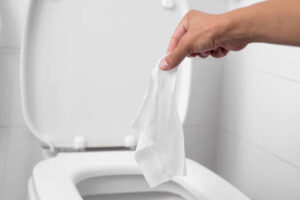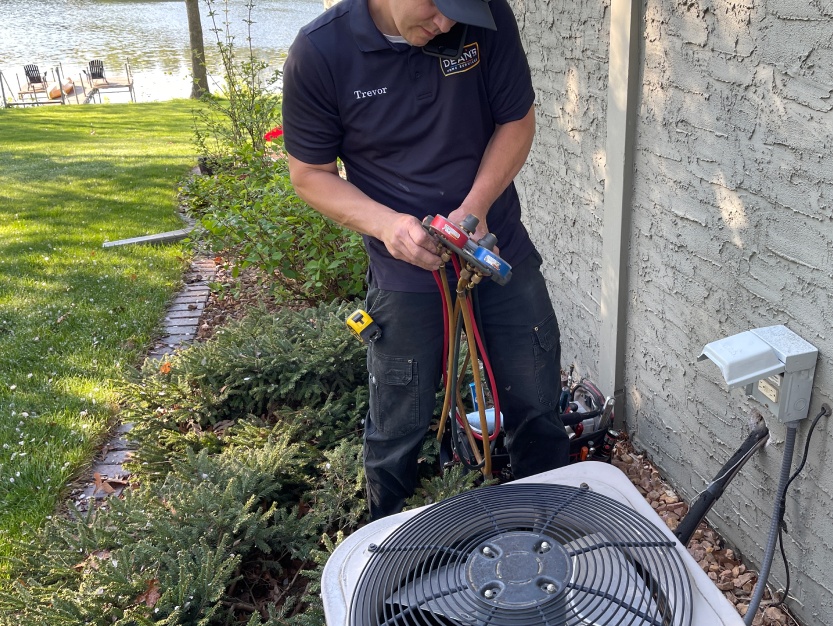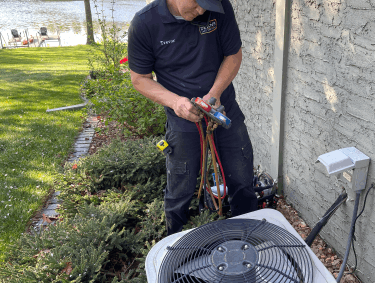The Truth About Flushable Wipes and Your Plumbing System
Flushable wipes may seem like a convenient and hygienic option for personal care, but many people don’t realize that these wipes can cause serious issues for their plumbing system. Marketed as safe to flush, they don’t break down in the same way as toilet paper, which can lead to costly blockages, fatbergs, and long-term damage. With the Dean’s team in Buffalo, MN, we recognize how these seemingly harmless wipes can cause headaches for homeowners, and we’re here to help you understand the associated risks.

Why Flushable Wipes Aren’t Safe to Flush
Flushable wipes are often marketed as being safe for your plumbing, but this isn’t always the case. While these wipes may break down slightly in water, they don’t disintegrate as quickly or thoroughly as toilet paper. In fact, many of these wipes are made from synthetic materials like polyester or polypropylene, which don’t break down at all. When flushed, they can get stuck in the pipes, causing blockages that can lead to plumbing repairs.
The problem starts when the wipes enter your plumbing system. Unlike toilet paper, which breaks down easily in water, these wipes can clump together, creating stubborn blockages. This buildup can lead to sluggish drains, overflowing toilets, or even full-on pipe blockages. If enough wipes pile up in your plumbing, they can create what’s known as a “fatberg,” a massive blockage made up of fats, oils, and other non-biodegradable waste that can cause serious backups.
Dangers of Clogged Pipes and Fatbergs
Clogged pipes are one of the most immediate risks of flushing wipes. As these blockages build up, they can stop wastewater from flowing properly, causing your sinks, showers, and toilets to drain slowly. If the clog worsens, you might end up with overflowing toilets or even raw sewage backing up into your home. Not only is this a huge mess, but it also brings serious health risks.
Another major concern is fatbergs, which are created when wipes combine with oils, fats, and grease that have been flushed or washed down the drain. These fatbergs form dense, solid masses that are nearly impossible to break down without professional intervention. Once a fatberg forms, it can block pipes completely, forcing you to call in a plumber to clear the obstruction. Removing a fatberg is a time-consuming and expensive process.
What Happens When You Flush Wipes?
When you flush wipes, they make their way through your plumbing, but they don’t always go as smoothly as you’d think. They can get stuck in different parts of the pipes, from the toilet trap to the main sewer line. As they move along, they can grab onto other debris or slowly accumulate inside the pipes, leading to a clog. The longer those wipes sit in the system, the higher the chances of a full blockage forming.
In many cases, these clogs aren’t immediate. It may take weeks or months for the buildup to cause noticeable issues, like slow draining or foul smells from the drains. The longer the issue is ignored, the bigger the problem becomes. Even if you don’t notice any immediate issues, the damage could be quietly progressing, and you could soon find yourself facing a plumbing emergency that requires costly repairs.
Common Misconceptions About Flushable Wipes
There’s a common misconception that just because a product is labeled “flushable,” it’s safe for plumbing systems. The term “flushable” is often misleading, as it doesn’t necessarily mean the wipes will break down in water. Many municipalities have issued warnings about the dangers of flushing wipes, reporting that even wipes labeled as “flushable” can cause major plumbing problems.
What To Do If Your Plumbing Is Already Affected
If you’ve already noticed signs of problems, such as slow-draining sinks, toilets, or showers, it’s important to act fast. The first step is to stop using your plumbing system in ways that could contribute to the problem. If the issue is a simple clog, you may be able to clear it using a plunger or drain snake. However, if the problem persists or is more severe, it’s time to call in a professional plumber to assess the situation.
A plumber will have the tools and expertise to identify the root cause of the blockage and clear it effectively. In some cases, a drain camera may be used to inspect the pipes and locate the exact point of obstruction.
Call Us To Unclog Your Flushable Wipe Blockage
If you’ve experienced plumbing issues from flushable wipes or suspect your system is starting to develop clogs, it’s best to tackle the problem early. Regular plumbing inspections, drain cleaning, and repairs can keep your pipes running smoothly and prevent expensive damage later. If you’re unsure about the condition of your pipes or believe there’s a fatberg clog, contact us today to schedule a professional plumbing inspection.







- Free annual evaluations
- 10% discount on repairs and equipment
- Priority scheduling
- No regular travel charges
- Discounted after-hours travel charges


